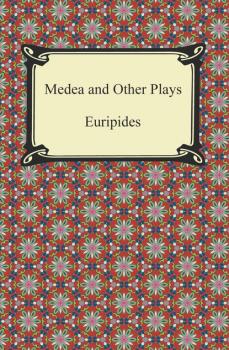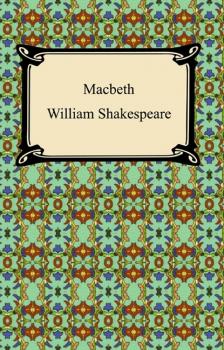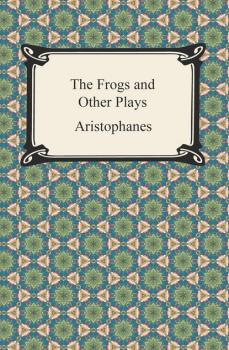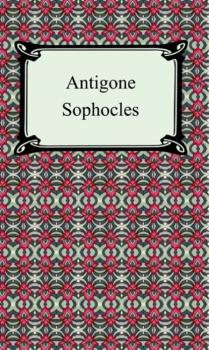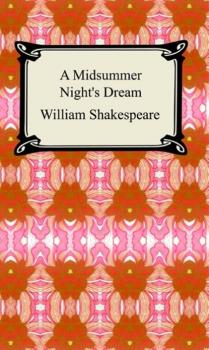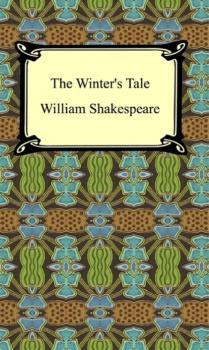Античная литература
Различные книги в жанре Античная литератураThe Suppliants
Though little is known for certain of his early life, Euripides was probably born around 460 b.c.e. to the farmer Mnesarchus and his wife Clito, and his studious nature quickly led him to a literary life in Athens. His work sticks out from that of his contemporaries for his attention to the political and social problems around him, although he never held public office. His plays are often ironic, pessimistic, and display radical rejection of classical decorum and rules. «The Suppliants» is one of Euripides' anti-war plays, and deals with a common Greek theme of leaving an enemy's dead body unburied. This story, about Adrastus and the Argive mothers against Creon of Thebes, explores the inhumanity of war, grief, and the merits and demerits of responsible government. It also points out some positive results of peace such as economic prosperity, improved education and the arts.
Medea and Other Plays
Euripides, along was Sophocles and Aeschylus, is largely responsible for the rise of Greek tragedy. It was in the 5th Century BC, during the height of Greece's cultural bloom, that Euripides lived and worked. Of his roughly ninety-two plays, only seventeen tragedies survive. Both ridiculed and lauded during his life, Euripides now stands as an innovator of the Greek drama. Collected here are four of Euripides' tragedies: «Alcestis», «Medea», «The Heracleidae», and «Hippolytus». «Alcestis» follows Ardemus' attempt to rescue his beloved wife Prince Alcestis in Hades. «Medea» tells the horrific tale of a woman who seeks revenge on her husband by killing her children. «The Heracleidae» is a tragedy of justice and virtue involving the children of the great Heracles. Lastly, «Hippolytus» tells of Hippolytus, son of Theseus, and his tragic fall at the hands of Phaedra. For the lover of drama and the ancient world, this collection is not to be missed—Euripides is seen here in all of his valor and brilliance.
Macbeth
Among the tragedies of Shakespeare, «Macbeth» is noted for the exceptional simplicity of the plot and the directness of the action. Here is no underplot to complicate or enrich, hardly more than a glimpse of humor to relieve the dark picture of criminal ambition, only the steady march toward an inevitable catastrophe. This tragedy illustrates in its close the conventional poetic justice that demands the triumph of the righteous cause and the downfall of the wicked. But there is not lacking that more subtle justice, so impressive in «Lear» because unaccompanied by the temporal reward of the good, which reveals itself in the subduing of character to what it works in. Far more terrible than the defeat and death of Macbeth is the picture of the degradation of his nature, when he appears in the scene before the battle like a beast at bay.
Henry VI, Part I
The beginning of Shakespeare's 'First Tetralogy,' which includes two other plays about King Henry VI and one on Richard III, it is so named because it was written in 1588, among some of the Bard's earliest works. This first history play in the cycle commences just after the death of Henry V, when England is at war with France. Across the Channel, Sir John Talbot battles Joan of Arc, or 'La Pucelle,' while the dissention that leads to the War of the Roses begins in England. Full of political and military machinations, «Henry VI, Part I» provides a solid introduction to this king's reign, as well as a segue to the remainder of his rule as depicted by Shakespeare's sequential plays.
The Frogs and Other Plays
Along with Sophocles and Euripides, Aristophanes is considered one of the three great Greek playwrights. Only eleven of his nearly forty plays survive in their entirety to this day. «The Frogs and Other Plays» includes the titular play along «The Wasps» and «The Thesmophoriazusae.» Produced the year after the death of Euripides, «The Frogs» laments the decay of Greek tragedy which Aristophanes attributed to that writer. It is an admirable example of the brilliance of his style, and of that mingling of wit and poetry with rollicking humor and keen satirical point which is his chief characteristic. Here, as elsewhere, he stands for tradition against innovation of all kinds, whether in politics, religion, or art. In «The Wasps» Aristophanes pokes satirical fun at the demagogue Cleon and the Athenian law courts that provide Cleon with his power. «The Thesmophoriazusae» is concerned with the schemes of a group of women at the Thesmophoria, an annual fertility celebration dedicated to Demeter, who angered by Euripides portrayal of women in his plays as mad, murderous, and sexually depraved, plan to exact revenge upon him.
Antigone
The second story in the Oedipus Trilogy, «Antigone», examines the conflict between public duty and personal loyalty. Following the banishment of Oedipus, Eteocles and Polyneices kill each other over a dispute of succession to the thrown of Thebes. Creon, Antigone's uncle, succeeds to the thrown and declares that no one may bury Polyneices under penalty of death. Antigone, disregards this order and buries Polyneices and is willing to face the consequence for doing so. As a result, Creon must choose between what he believes to be his civic duty and his personal loyalty to his family.
Henry IV, Part I
William Shakespeare's «King Henry IV, Part I» is one the playwright's classic historical English dramas. The narrative revolves around the rebellion against King Henry IV led by the Welshman Glendower and the Percies. «King Henry IV, Part I» is a play with excellent courtly drama and battlefield action, with a riotous comedic subplot.
A Midsummer Night's Dream
"A Midsummer Night's Dream", one of Shakespeare's earliest comedies is a spectacular tale of fantasy. The story revolves around two couples (Hermia and Lysander and Helena and Demetrius) who escape to a fairyland forest ruled by Oberon and Titania, the King and Queen of the Fairies. «A Midsummer Night's Dream», is light-hearted fare that exhibits some of Shakespeare's greatest comedic and lyrical work.
Coriolanus
Based largely on the accounts of Plutarch and Livy, «Coriolanus» is a tragedy concerning the legendary Roman leader Caius Martius, later given the honorary name Coriolanus. From the first act with riots over grain to later pitched battles with the Volscian army, Coriolanus proves himself to be a brilliant general with remarkable bravery. In his bid for a position in the Roman Senate, he discovers the power of both his allies and his enemies, revealing his militaristic pride and a disdain for plebeians, as well as and his unwillingness to slander for personal gain and opaque heroism. Arguably one of the best political plays ever written, Shakespeare provides a protagonist that faces a fascinating struggle of personality and politics which has rather tragic consequences.
The Winter's Tale
William Shakespeare's The Winter's Tale was one of the last plays that the playwright would write. A classic romance with elements of tragedy, The Winter's Tale is an audience favorite and is often performed. The story revolves around Leontes, the King of Sicilia, who mistakenly comes to believe that his wife has committed adultery. In the end the truth is discovered and the two reconcile against the backdrop of a happy wedding celebration.

